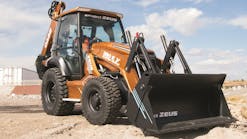Editor’s note: This article first appeared in the November/December 2015 edition of Grading & Excavation Contractor.
Naturally, interest rates vary by contractor, by their financial position, and various other factors. “I financed a crane for somebody recently and they had pretty reasonable rates,” says Rob Misheloff, president of Smarter Finance USA, Irvine, CA. “The rates were roughly 6.5% per year. So for every $100,000 of cost it was roughly $6,500 a year in finance charges. Then when we ran into somebody with rough credit, particularly a bankruptcy or tax liens, depending on the situation, rates could be really, really high. Sometimes we see financing quoted in the 20% per year range, or even higher, depending on how bad the situation is.”
Editor's note: This article first appeared in the November/December 2015 edition of Grading & Excavation Contractor. Naturally, interest rates vary by contractor, by their financial position, and various other factors. “I financed a crane for somebody recently and they had pretty reasonable rates,” says Rob Misheloff, president of Smarter Finance USA, Irvine, CA. “The rates were roughly 6.5% per year. So for every $100,000 of cost it was roughly $6,500 a year in finance charges. Then when we ran into somebody with rough credit, particularly a bankruptcy or tax liens, depending on the situation, rates could be really, really high. Sometimes we see financing quoted in the 20% per year range, or even higher, depending on how bad the situation is.” [text_ad] Most officials interviewed for this article says a contractor’s credit track record and current work backlog are more important factors in getting a loan than is the expectation of new work coming in. We asked Misheloff if he would finance equipment for which a customer expected to get work. Misheloff says he works with customers to calculate how much money they will make with a piece of equipment—then compares that to the payment. “In one case recently, a prospective customer says, “I could keep on driving someone else’s excavator,'” says Misheloff.Most officials interviewed for this article says a contractor’s credit track record and current work backlog are more important factors in getting a loan than is the expectation of new work coming in. We asked Misheloff if he would finance equipment for which a customer expected to get work. Misheloff says he works with customers to calculate how much money they will make with a piece of equipment—then compares that to the payment. “In one case recently, a prospective customer says, “I could keep on driving someone else’s excavator,’” says Misheloff.
“Not unless they truly expect to get the work,” he says. “We’re working with somebody right now who has been paying $100,000 a month in rental on his equipment. And we’re working through the numbers, and he’s going to need roughly a million dollars worth of equipment over the next six months. And the payments probably will be in the $35,000 to $40,000 a month range. So $35,000 to $40,000 a month for equipment that you own at the end of the term is a whole lot better than $100,000 a month and at the end you have nothing.
“We talk to several first-time owner-operators of dump trucks who were making $60,000 a year driving a dump truck,” says Misheloff. “But once they get into their own dump truck they can bring in $20,000 to $30,000 of revenue monthly. And that’s not a wish. Sometimes the company they’re working for will say go ahead, get your own truck and we’ll pay you $80 an hour to haul for us. We work the numbers out with them, and after all costs are counted, including maybe setting aside $1,000 a month for repairs to the truck, and a lot of times the person—instead of making $5,000 a month—can net $13,000 to $16,000 a month.”
All lenders told Grading & Excavation Contractor that the requirements and qualifications for getting a loan become more escalated as the amount of the loan goes up. Misheloff says that profit margins—particularly a history of making a profit—are important in the go/no go decision. “In financing larger amounts, we want to look at two years of tax returns, and some financial statements,” says Misheloff. “It’s harder to make a loan to someone who has only been marginally profitable than to somebody who’s got a large amount of booked revenue and profit coming through. An underwriter’s projection of risk has a big impact on what the financing rate will be because we’re essentially underwriting that risk.”
Many lenders, especially where the borrower is a closely held company, ask for personal guarantees to back up a loan. Misheloff, who finances mostly smaller contractors, says he asks for a personal guarantee on almost all loans. “But we do run across some larger companies, call them corporate only,” he says. “If the company has been in business for five years or more, has a strong Dun & Bradstreet profile, and a strong history of paying their creditors on time, then we can do a corporate only loan.”
Caterpillar Financial Services North America region manager, John Marino, says smaller, closely held contractors are usually receptive to offering a personal guarantee. Larger contractors where ownership is spread among several individuals are usually more reluctant to offer a personal guarantee. “If a company is rebounding from difficult times, a personal guarantee becomes more critical to show the owner’s belief in his or her future prospects for their company,” says Marino.
At John Deere Financial, David Schmidt says the company typically asks for a personal guarantee from a small- to medium-sized contractor that is closely held. “The personal guarantee is almost as much a check and balance tool as it is an expectation that we expect that person’s going to repay a bad debt from their personal funds,” says Schmidt. “If you’re making decisions about your business and you know that you also have a personal investment, then it’s like a check and balance in the owner’s mind, versus if it’s just their business, and they feel like if they make a mistake on this, just my business is at risk.
Nationwide Business Capital offers an application-only program for financing up to $150,000. The application-only program is a one-page application, also available for applying online. If the transaction is more than $150,000 but less than $250,000, the company requires two years of personal and corporate tax returns for closely held companies, an interim financial statement, and a personal financial statement on the majority shareholders.
For transactions greater than $250,000, Nationwide requires three years of personal and corporate tax returns. “We do not traditionally ask for business projections,” says Nationwide’s Bowles.
We asked Alliance’s Abelsohn if a loan applicant needs to submit a business plan. “Unless the business is in an early stage, a business plan is not as important to us in credit review and analysis,” he says. “We are underwriting to their past history of payments, collateral, and the overall structure of the financing.
“Profit margins are very important in underwriting for our middle market group (over $250,000 deals),” says Abelsohn. “A business’ cash flow provides lenders with the comfort of the company’s ability to service its existing obligations along with the new purchase that we’re looking to finance.”








